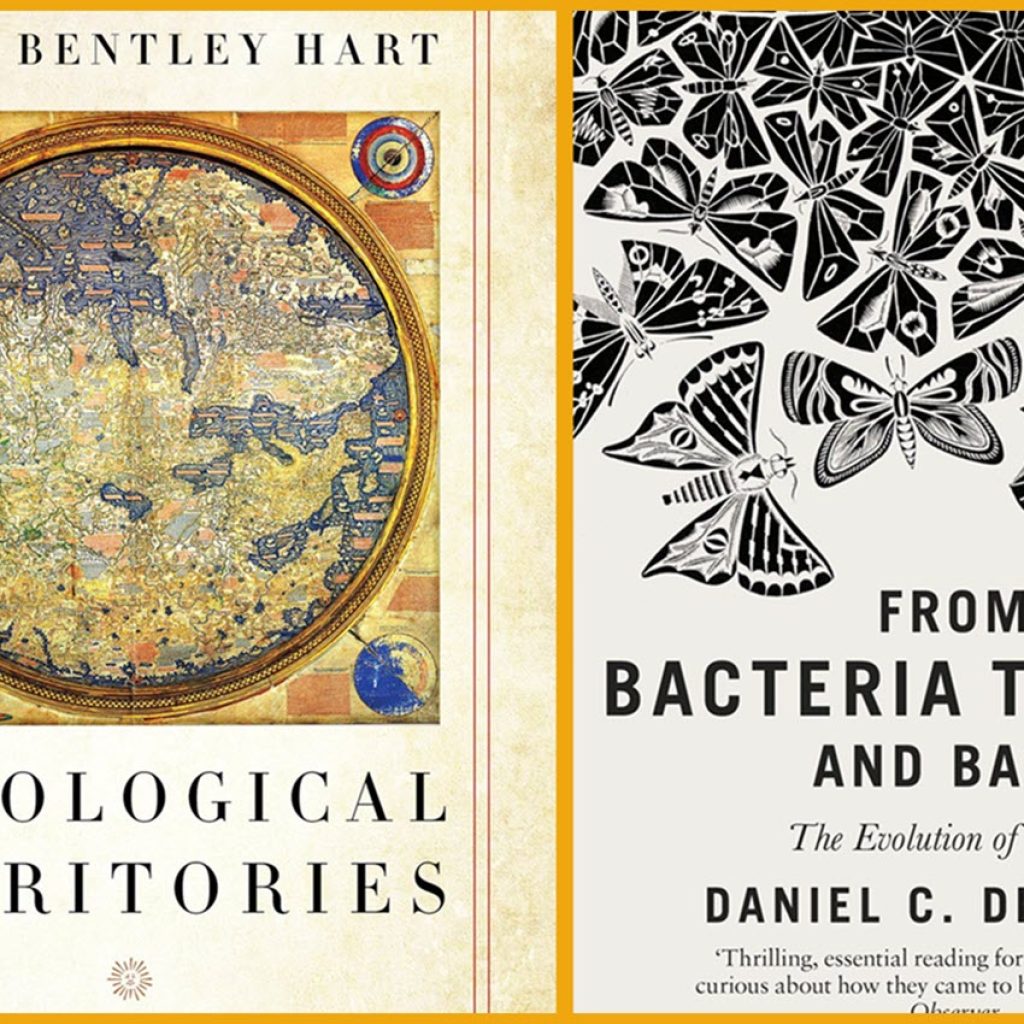“It is not enough simply to remain indifferent to the whole question of God, moreover, because thus understood it is a question ineradicably present in the very mystery of existence, or of knowledge, or of truth, goodness, and beauty. It is also the question that philosophical naturalism is supposed to have answered exhaustively in the negative, without any troubling explanatory lacunae, and therefore the question that any aspiring philosophical naturalist must understand before he or she can be an atheist in any intellectually significant way. And the best way to begin is to get a secure grasp on how radically, both conceptually and logically, belief in God differs from belief in the gods.” ((—from The Experience Of God by D. B. Hart))
“Obviously, then, it is God in the former— the transcendent— sense in whom it is ultimately meaningful to believe or not to believe. The possibility of gods or spirits or angels or demons, and so on, is a subordinate matter, a question not of metaphysics but only of the taxonomy of nature (terrestrial, celestial, and chthonic). To be an atheist in the best modern sense, however, and so to be a truly intellectually and emotionally fulfilled naturalist in philosophy, one must genuinely succeed in not believing in God, with all the logical consequences such disbelief entails.…” ((—from The Experience Of God by D. B. Hart))
A few excerpts from Dr. Salviander:
“…If you begin with “a god” it is a tip-off that I can’t take you seriously. I don’t believe in “a god.” If you don’t understand the distinction, there’s no point to having a discussion. If you want to talk to theists about God in a serious way, read Eve Keneinan’s “God vs. The Gods” https://lastedenblog.wordpress.com/2016/06/06/god-vs-the-gods/ As she points out, if you don’t understand this distinction, you will literally never understand what serious theists are talking about. I am not sure what I’m supposed to take away from all these [folks] jetpacking in here to demonstrate that they not only don’t understand the point being made, but REFUSE to understand it. It’s like trying to discuss physics with flat-earthers who refuse to learn anything about physics. You don’t have to literally believe the God of the Bible exists to understand and acknowledge the philosophical nature of the claims being made. If you’re going to argue against something, you have to actually know what you’re arguing against. Sun Tzu, people. I automatically ignore anyone who refers to God as “a god.” Not because doing so shows disrespect, but because it shows abject failure to understand the nature of that which is being discussed. Atheists who do this, thinking they’re cleverly exposing theology as a take-what-you-want ideological buffet, are committing the same category error as someone who insists there’s no difference between a universe and a galaxy. Meaningful discussion with them is just not possible….”
End Excerpts.
And, then, a few excerpts from Six Day Science https://sixdayscience.com/about-us/faqs/faqa/
Begin Excerpts:
“….I enjoy interacting with people on social media. However, I’m not inclined to throw away my time on comments and questions from people who are not truly seeking answers. If you’re an obvious time-waster, I’m most likely going to ignore you, block you, or feature you as a “Don’t Be This Guy” to my followers…. Among other things, I’ll know you’re a time-waster if you use phrases like:
- “sky daddy”
- “sky fairy”
- “imaginary friend”
- “invisible friend”
- “your god”
- “there’s no evidence for god”
- “where’s your proof of your god?”
- “the burden of proof is on you”
- anything that smacks of scientism
- any dial-a-fallacy nonsense
- etc.
—or if you engage in sarcasm, mockery, insults, posturing, tone-policing, or trot out any of a multitude of creaky old atheist talking points. If this is how you communicate with Christians, odds are you’re not interested in a sincere exchange of ideas. I simply don’t have the time or patience to engage with people who are not serious….”
End Excerpts.
A brief observation about the phrase Sky-Daddy: If the Non-Theist is right and the Sky-Daddy Brand of God is God then God does not Exist in which case Reality Itself is without Existence and without Being. But then the Non-Theist must practice affirming his own Non-Being||Non-Existence and in fact Reality’s own Non-Being || Non-Existence. That of course is non-sense and so he joins the Christian and both the Christian and the Non-Theist practice a more “Non-Daddy-In-The-Sky” metaphysic. However, the Christian affirms Being Itself & Existence Itself and, so, once our Non-Theist friends get wind of said affirmation well they – by pure impulse – then deny “that” given that “that” just is the Christian’s paradigm vis-à-vis “GOD”. So, then, the Non-Theist is left with, perhaps, his own unique brand of Sky-Daddy rather than with Being/Existence, which is, on the trade, nonsense. Tangentially related is the observation that IF the Non-Theist genuinely insists on the Sky-Daddy brand THEN the A-Theist’s hope to use what he calls “A-Theology” finds its terminus in that same reduction to absurdity.
Edward Feser and others will on occasion employ the phrase Explanatory Terminus and with that thought in mind E. Feser gives advice to the proverbial Hostile Atheist Reader:
“The reason is that for the classical theist, whatever else we mean by “God,” we certainly mean by that label to name the ultimate source, cause, or explanation of things. Properly to understand classical theism, the hostile atheist reader might even find it useful to put the word “God” out of his mind for the moment — given all the irrelevant associations the word might lead him to read into the present discussion — and just think instead of “the ultimate source of things.” Feser
Given “the ultimate source of things” as per “God” we find, then, that should the Non-Theist “SAY” that “There is no God” what the Christian then “HEARS” ((..and what logic demands given the fact that “words” have “semantic intent” / “meaning”…)) with respect to Being Itself and Existence Itself and Absolute Mind Itself amounts to “…there is no ultimate foundation of/for “Reality” even as there is no Being and no Existence and no Mind….”
Before moving on to David Bentley Hart and several of his criticisms of the stock string of fallacies inside of the God vs. gods vs. The Gods discussion, the following links help focus our lens on a few other areas of the question:
-
- One God Further Objection https://edwardfeser.blogspot.com/2011/04/one-god-further-objection.html
- Further Thought On The One God Further Objection https://edwardfeser.blogspot.com/2011/04/further-thought-on-one-god-further.html
- Why Is There Anything At All? It’s Simple https://edwardfeser.blogspot.com/2013/10/why-is-there-anything-at-all-its-simple.html
- God vs. The Gods https://lastedenblog.wordpress.com/2016/06/06/god-vs-the-gods/
- Which God Exists https://lastedenblog.wordpress.com/2016/05/07/which-god-exists/
- Science And Theology: Where The Consonance Really Lies by David Bentley Hart at https://metachristianity.com/science-and-theology-where-the-consonance-really-lies-by-david-bentley-hart/
- On Intuitions by E. Feser at https://edwardfeser.blogspot.com/2010/07/on-intuitions.html
- Unintuitive Metaphysics by E. Feser at https://edwardfeser.blogspot.com/2015/08/unintuitive-metaphysics.html
- Theological Non-Cognitivism https://www.reasonablefaith.org/writings/question-answer/theological-non-cognitivism
- The Spiderman Fallacy https://veritasdomain.wordpress.com/2017/01/27/the-spiderman-fallacy-argument-against-christianity/
- The Spiderman Fallacy https://www.gotquestions.org/Spider-Man-fallacy.html
- Some Of Us Just Go One God Further Part 1:
A. https://lastedenblog.wordpress.com/2016/07/20/some-of-us-just-go-one-god-further/
B. https://maverickphilosopher.typepad.com/maverick_philosopher/2010/07/some-of-us-just-go-one-god-further.html - Some Of Us Just Go One God Further Part 2: https://lastedenblog.wordpress.com/2019/11/14/some-of-us-just-go-one-god-further-2/
Quote 1 of 2 from David Bentley Hart:
“…There are two senses in which the word “God” or “god” can properly be used. Most modern languages generally distinguish between the two usages as I have done here, by writing only one of them with an uppercase first letter, as though it were a proper name— which it is not. Most of us understand that “God” (or its equivalent) means the one God who is the source of all things, whereas “god” (or its equivalent) indicates one or another of a plurality of divine beings who inhabit the cosmos and reign over its various regions. This is not, however, merely a distinction in numbering, between monotheism and polytheism, as though the issue were merely that of determining how many “divine entities” one happens to think there are. It is a distinction, instead, between two entirely different kinds of reality, belonging to two entirely disparate conceptual orders.
In fact, the very division between monotheism and polytheism is in many cases a confusion of categories. Several of the religious cultures that we sometimes inaccurately characterize as “polytheistic” have traditionally insisted upon an absolute differentiation between the one transcendent Godhead from whom all being flows and the various “divine” beings who indwell and govern the heavens and the earth. Only the one God, says Swami Prabhavananda, speaking more or less for the whole of developed Vedantic and Bhaktic Hinduism, is “the uncreated”: “gods, though supernatural, belong … among the creatures. Like the Christian angels, they are much nearer to man than to God.”
Conversely, many creeds we correctly speak of as “monotheistic” embrace the very same distinction. The Adi Granth of the Sikhs, for instance, describes the One God as the creator of Brahma, Vishnu, and Shiva. In truth, Prabhavananda’s comparison of the gods of India to Christianity’s angels is more apt than many modern Christians may realize. Late Hellenistic pagan thought often tended to draw a clear demarcation between the one transcendent God (or, in Greek, ho theos, God with the definite article) and any particular or local god (any mere “inarticular” theos) who might superintend this or that people or nation or aspect of the natural world; at the same time, late Hellenistic Jews and Christians recognized a multitude of angelic “powers” and “principalities,” some obedient to the one transcendent God and some in rebellion, who governed the elements of nature and the peoples of the earth. To any impartial observer at the time, coming from some altogether different culture, the theological cosmos of a great deal of pagan “polytheism” would have seemed all but indistinguishable from that of a great deal of Jewish or Christian “monotheism.”
To speak of “God” properly, then— to use the word in a sense consonant with the teachings of orthodox Judaism, Christianity, Islam, Sikhism, Hinduism, Bahá’í, a great deal of antique paganism, and so forth— is to speak of the one infinite source of all that is: eternal, omniscient, omnipotent, omnipresent, uncreated, uncaused, perfectly transcendent of all things and for that very reason absolutely immanent to all things. God so understood is not something posed over against the universe, in addition to it, nor is he the universe itself. He is not a “being,” at least not in the way that a tree, a shoemaker, or a god is a being; he is not one more object in the inventory of things that are, or any sort of discrete object at all. Rather, all things that exist receive their being continuously from him, who is the infinite wellspring of all that is, in whom (to use the language of the Christian scriptures) all things live and move and have their being. In one sense he is “beyond being,” if by “being” one means the totality of discrete, finite things. In another sense he is “being itself,” in that he is the inexhaustible source of all reality, the absolute upon which the contingent is always utterly dependent, the unity and simplicity that underlies and sustains the diversity of finite and composite things. Infinite being, infinite consciousness, infinite bliss, from whom we are, by whom we know and are known, and in whom we find our only true consummation.
All the great theistic traditions agree that God, understood in this proper sense, is essentially beyond finite comprehension; hence, much of the language used of him is negative in form and has been reached only by a logical process of abstraction from those qualities of finite reality that make it insufficient to account for its own existence. All agree as well, however, that he can genuinely be known: that is, reasoned toward, intimately encountered, directly experienced with a fullness surpassing mere conceptual comprehension.
By contrast, when we speak of “gods” we are talking not of transcendent reality at all, but only of a higher or more powerful or more splendid dimension of immanent reality. Any gods who might be out there do not transcend nature but belong to it. Their theogonies can be recounted— how some rose out of the primal night, how some were born of other, more titanic progenitors, how others sprang up from an intermingling of divine and elemental forces, and so on— and according to many mythologies most of them will finally meet their ends. They exist in space and time, each of them is a distinct being rather than “being itself,” and it is they who are dependent upon the universe for their existence rather than the reverse. Of such gods there may be an endless diversity, while of God there can be only one. Or, better, God is not merely one, in the way that a finite object might be merely singular or unique, but is oneness as such, the one act of being and unity by which any finite thing exists and by which all things exist together. He is one in the sense that being itself is one, the infinite is one, the source of everything is one. Thus a plurality of gods could not constitute an alternative to or contradiction of the unity of God; they still would not belong to the same ontological frame of reference as he.
Obviously, then, it is God in the former— the transcendent— sense in whom it is ultimately meaningful to believe or not to believe. The possibility of gods or spirits or angels or demons, and so on, is a subordinate matter, a question not of metaphysics but only of the taxonomy of nature (terrestrial, celestial, and chthonic). To be an atheist in the best modern sense, however, and so to be a truly intellectually and emotionally fulfilled naturalist in philosophy, one must genuinely succeed in not believing in God, with all the logical consequences such disbelief entails.…” (italics added)
End Quote 1 of 2 from David Bentley Hart, The Experience of God
DBH alludes there to a problem too often left unaddressed:
“…it is the transcendent God in whom it is ultimately meaningful not to believe….. To be an atheist in the best modern sense, and so to be a truly intellectually and emotionally fulfilled naturalist in philosophy, one must genuinely succeed in not believing in God, with all the logical consequences this entails….”
For segues into that problem of Non-Theism vis-à-vis Non-God vis-à-vis something like “NONE-What-Coherence-Needs” so to speak, see perhaps [A] ATHEISM: THE WORLD IS FLAT – THE NONE, THE NON-, THE NON-THEIST at https://metachristianity.com/atheism-world-flat-none-non-non-theist/ and also see [B] THE TWIN-FALLACIES OF NOTHING-BUT NON-BELIEF AND OF DEFAULT-ATHEISM at https://metachristianity.com/the-twin-fallacies-of-nothing-but-non-belief-and-of-default-atheism/ Quote 2 of 2 picks up where the first left off and is as follows.
Quote 2 of 2 from David Bentley Hart:
“…It is not enough simply to remain indifferent to the whole question of God, moreover, because thus understood it is a question ineradicably present in the very mystery of existence, or of knowledge, or of truth, goodness, and beauty. It is also the question that philosophical naturalism is supposed to have answered exhaustively in the negative, without any troubling explanatory lacunae, and therefore the question that any aspiring philosophical naturalist must understand before he or she can be an atheist in any intellectually significant way. And the best way to begin is to get a secure grasp on how radically, both conceptually and logically, belief in God differs from belief in the gods.
This ought not to be all that difficult a matter; in Western philosophical tradition, for instance, it is a distinction that goes back at least as far as Xenophanes (c. 570– c. 475 BC). Yet the most pervasive error one encounters in contemporary arguments about belief in God— especially, but not exclusively, on the atheist side— is the habit of conceiving of God simply as some very large object or agency within the universe, or perhaps alongside the universe, a being among other beings, who differs from all other beings in magnitude, power, and duration, but not ontologically, and who is related to the world more or less as a craftsman is related to an artifact.
At a trivial level, one sees the confusion in some of the more shopworn witticisms of popular atheism: “I believe neither in God nor in the fairies at the bottom of my garden,” for instance, or “All people are atheists in regard to Zeus, Wotan, and most other gods; I simply disbelieve in one god more.” Once, in an age long since vanished in the mists of legend, those might even have been amusing remarks, eliciting sincere rather than merely liturgical laughter; but, even so, all they have ever demonstrated is a deplorable ignorance of elementary conceptual categories. If one truly imagines these are all comparable kinds of intellectual conviction then one is clearly confused about what is at issue. Beliefs regarding fairies are beliefs about a certain kind of object that may or may not exist within the world, and such beliefs have much the same sort of intentional shape and rational content as beliefs regarding one’s neighbors over the hill or whether there are such things as black swans. Beliefs regarding God concern the source and ground and end of all reality, the unity and existence of every particular thing and of the totality of all things, the ground of the possibility of anything at all. Fairies and gods, if they exist, occupy something of the same conceptual space as organic cells, photons, and the force of gravity, and so the sciences might perhaps have something to say about them, if a proper medium for investigating them could be found.
We can, if nothing else, disabuse ourselves of belief in certain gods by simple empirical methods; we know now, for example, that the sun is not a god named Tonatiuh, at least not one who must be nourished daily on human blood lest he cease to shine, because we have withheld his meals for centuries now without calamity. God, by contrast, is the infinite actuality that makes it possible for either photons or (possibly) fairies to exist, and so can be “investigated” only, on the one hand, by acts of logical deduction and induction and conjecture or, on the other, by contemplative or sacramental or spiritual experiences. Belief or disbelief in fairies or gods could never be validated by philosophical arguments made from first principles; the existence or nonexistence of Zeus is not a matter that can be intelligibly discussed in the categories of modal logic or metaphysics, any more than the existence of tree frogs could be; if he is there at all, one must go on an expedition to find him, or at least find out his address. The question of God, by contrast, is one that can and must be pursued in terms of the absolute and the contingent, the necessary and the fortuitous, potency and act, possibility and impossibility, being and nonbeing, transcendence and immanence. Evidence for or against the existence of Thor or King Oberon would consist only in local facts, not universal truths of reason; it would be entirely empirical, episodic, psychological, personal, and hence elusive. Evidence for or against the reality of God, if it is there, saturates every moment of the experience of existence, every employment of reason, every act of consciousness, every encounter with the world around us.
Now, manifestly, one should not judge an intellectual movement by its jokes (even if one suspects that there is little more to it than its jokes). But exactly the same confusion shows itself in the arguments that many contemporary atheists make in earnest: For instance, “If God made the world, then who made God?” Or the famous dilemma drawn, in badly garbled form, from Plato’s Euthyphro, “Does God command a thing because it is good, or is it good because God commands it?” I address both questions below (in my third and fifth chapters, respectively), so I shall not do so here. I shall, however, note that not only do these questions not pose deep quandaries for believers or insuperable difficulties for a coherent concept of God; they are not even relevant to the issue. And, until one really understands why this is so, one has not yet begun to talk about God at all. One is talking merely about some very distinguished and influential gentleman or lady named “God,” or about some discrete object that can be situated within a class of objects called “gods” (even if it should turn out that there happens to be only one occupant of that class)…” (italics added)
End Quote 2 of 2 from David Bentley Hart, The Experience of God
Overlapping Segue:
“Miracles In Other Religions? Eyewitness Testimony? Mermaids? Alien Abductions? Flying Spaghetti Monster? Zeus? Thor? Copycat-Gods? Celestial Teapots?” at https://metachristianity.com/miracles-in-other-religions-eyewitness-testimony-mermaids-alien-abductions-flying-spaghetti-monster-zeus-thor-copycat-gods-celestial-teapots/
Another Overlapping Segue:
Necessitarianism, Unintelligibility, PSR//Principle of Sufficient Reason, Necessary Being, Contingent Being, Brute Fact, Intelligibility, Reductio, and the PSR-Free World — note that the first few paragraphs are borrowing in part from https://twitter.com/TDisputations and from https://twitter.com/AleMartnezR1 as per the following:
“To deny the principle of sufficient reason is to affirm that a contingent being which exists, though not by itself, can be uncaused or unconditioned. “Now, what is uncaused or unconditioned exists by itself. Therefore, an uncaused contingent being would at the same time exist by itself and not by itself—which is absurd.” (Garrigou-Lagrange) as per the following:
Question: “Is there a world where there were only contingent entities even possible? Is there an atheist willing to concede this much, to keep his atheism alive?”
Reply/Answer: “A brute fact, properly considered, wouldn’t be contingent or necessary (those are sufficient reasons). In fact, if reality were built on brute facts, everything would be a brute fact because something without intelligibility can’t impart intelligibility to anything else. We couldn’t even say this ends up in necessitarianism, since that would imply necessary connections between events that aren’t justified in a PSR-free world. In reality, it would be most absolutely radical form of indeterminism.”
Appeals to Brute Fact are invariably followed by appeals to still more bizarre linguistic games as if absurdity is softened by equivocation. As E. Feser observes supposing the set of IOU’s counts as real money as long as you stack them high enough expunges *Explanation in full. One’s Chain of IOU’s has now expunged *Explanation not merely *by* our syntax but also *from* our syntax (wait for it) and the chain of IOU’s has no ceiling — finding nothing but the Inexplicable as its fruit – meaning that even just the [*not *even *in *principle] syntax is not available to it – at all – in the full-on ontic sense of Unavailable and therefore in the full-on ontic sense of Unintelligibility.
Non-Theism has to face Contingency and her hand is forced by “physics’ testimony” weighted heavily in the affirmation that Time is neither an Absolute Reference Frame nor the Absolute’s Own Frame of Reference. The evidence weights heavily towards [Eternalism] over [Presentism] such that Time is ontologically emergent — it is not an irreducible feature of reality’s fundamental nature. Contingency-Or-Not isn’t the question as (Non-Theism’s) “Time” v. “Change” becomes a Currency devoid of value & Metaphysical Naturalism becomes Allegorical//Metaphorical. The [Beginning Of Time] just is the [Beginning of Change] and Non-Theism’s scramble to embrace the full-on Reductio of Brute Fact is predictably placed in this discussion because whichever way Non-Theism runs we find that BOTH Eternalism AND Presentism force reductions to absurdity within Metaphysical Naturalism while BOTH comport with the Christian Metaphysic. Dr. Carroll’s “Something Deeply Hidden: Quantum Worlds and the Emergence of Spacetime” is helpful. Many Christians DO defend Presentism and yet Christians do NOT affirm [PRESENTISM FULL-STOP] but — rather — the ontological means to BOTH concrete Presentism AND concrete Timelessness ~~ and so on regarding Necessitarianism, Unintelligibility, PSR//Principle of Sufficient Reason, Necessary Being, Contingent Being, Brute Fact, Intelligibility, Reductio, and the PSR-Free World.
“…the OT predicts the coming of Jesus in the book of Isaiah, and…all throughout the Torah and the rest of the OT. The New Testament does not predict the Quran or the Book of Mormon…” ((…from Twitter’s @J_Lopeli…))
—References—
-
- Sarah Salviander, Ph.D. — Six Day Science https://sixdayscience.com/about-us/faqs/faqa/
- Eve Keneinan — God vs. The Gods https://lastedenblog.wordpress.com/2016/06/06/god-vs-the-gods/
- Eve Keneinan — Which God Exists https://lastedenblog.wordpress.com/2016/05/07/which-god-exists/
- Strange Notions — The Santa Claus Proof For God’s Existence https://strangenotions.com/the-santa-claus-proof-for-gods-existence/
- One God Further Objection https://edwardfeser.blogspot.com/2011/04/one-god-further-objection.html
- Further Thought On The One God Further Objection https://edwardfeser.blogspot.com/2011/04/further-thought-on-one-god-further.html
- Why Is There Anything At All? It’s Simple https://edwardfeser.blogspot.com/2013/10/why-is-there-anything-at-all-its-simple.html
- God, Gods, And Faries https://www.firstthings.com/article/2013/06/god-gods-and-fairies
- Science And Theology: Where The Consonance Really Lies by David Bentley Hart at https://metachristianity.com/science-and-theology-where-the-consonance-really-lies-by-david-bentley-hart/
- On Intuitions by E. Feser at https://edwardfeser.blogspot.com/2010/07/on-intuitions.html
- Unintuitive Metaphysics by E. Feser at https://edwardfeser.blogspot.com/2015/08/unintuitive-metaphysics.html
- Theological Non-Cognitivism https://www.reasonablefaith.org/writings/question-answer/theological-non-cognitivism
- The Spiderman Fallacy https://veritasdomain.wordpress.com/2017/01/27/the-spiderman-fallacy-argument-against-christianity/
- The Spiderman Fallacy https://www.gotquestions.org/Spider-Man-fallacy.html
- Some Of Us Just Go One God Further Part 1:
A. https://lastedenblog.wordpress.com/2016/07/20/some-of-us-just-go-one-god-further/
B. https://maverickphilosopher.typepad.com/maverick_philosopher/2010/07/some-of-us-just-go-one-god-further.html - Some Of Us Just Go One God Further Part 2: https://lastedenblog.wordpress.com/2019/11/14/some-of-us-just-go-one-god-further-2/





